Tips for managing at home
Explore this page for ideas on supporting your child and family with everyday challenges at home.
These webpages and online materials have been developed to support families of children who experience difficulties with attention, regulation, and concentration. This includes children diagnosed with attention deficit hyperactivity disorder (ADHD).
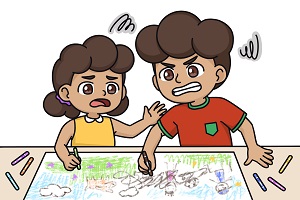
There are times when siblings (brothers and sisters) argue or don’t get along. They’ll argue about different things as they grow and develop, and as their interests change.
Sibling conflict can be unpleasant, however children learn a lot through these experiences.
Some things that they may learn can include:
- understanding their own feelings and how to express them
- problem solving and negotiating
- thinking about another person’s point of view
- respecting other people’s opinions, feelings and belongings.
These important skills will help them build and keep relationships throughout their lives.
Explore these links for ideas on how you can support your child to resolve conflict with siblings.
For younger children
Why children and siblings fight | Raising Children Network
Preventing sibling fights | Raising Children Network
Handling sibling fights | Raising Children Network
Brothers and sisters | Bringing Up Great Kids
For older children
How to stop sibling fights: teenagers | Raising Children Network
Teen sibling fights & arguments: options | Raising Children Network
As your child goes through life, they’ll experience a range of different and often big emotions.
Learning how to process big emotions is important for everyone.
When children are young this can be difficult.
Children with ADHD can experience added challenges and may need extra support to navigate their emotions.
There are many things you can do to support your child to understand and work through their big emotions.
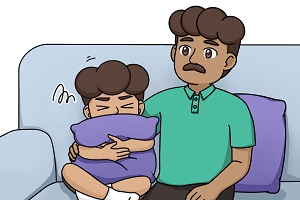
Explore these links to learn more:
Calming down for children: how to help | Raising Children Network
Self-regulation in children & teenagers | Raising Children Network
Understanding emotions: children & teens | Raising Children Network
Summary
- Screen time and technology are part of most children’s lives.
- Managing screen time is a challenge for most parents.
- More research about the relationship between screen time and ADHD is needed.
- There are ways that you can make screen time part of a healthy and balanced lifestyle.
Children use many different types of screens every day. This includes mobile phones, tablets, gaming devices, computers, laptops and TVs.
Research into the effect of screen time on children’s development is difficult because technology and the way children use screens is rapidly changing. More research on the relationship between screen time and ADHD is needed.
We do know that using screens a lot affects sleep and physical activity. Both these are important for good health and development. Getting enough sleep and physical activity are linked to reduced ADHD symptoms.
ADHD and screen time
Children with ADHD may find it difficult to manage screen time. This might impact how they behave when it is time to finish screen time and move on to another activity.
You may notice they have difficulty:
- understanding and working through big emotions
- keeping track of time
- following instructions.
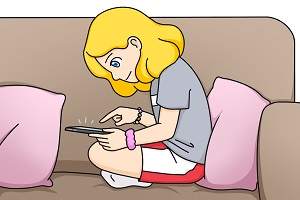
How you can help
Adults play a big role in helping to manage screen time.
Use parental controls on devices to be consistent when managing time limits. These controls also provide timing reminders and lock the device once the agreed time has ended.
Be understanding and ready to support your child to move through the big emotions that come up when screen time ends.
See Supporting big emotions section above for more information and ways to support your child.
Involve your child by talking with them about why screen time needs to be balanced with other activities and explain household rules for when screens can be used, what can be watched or played on them, and how long they can be used for.
These links can help you learn more about managing your family’s technology use and screen time
Screen time: checklist for healthy use | Raising Children Network
A family technology plan: how to make one | Raising Children Network
Beyond screen time: kids & a digital world | Raising Children Network
Screen time: how it helps children learn | Raising Children Network
Managing screen time: children 3-11 years | Raising Children Network
Screen time & physical activity: kids | Raising Children Network
Healthy family screen time: 5 tips | Raising Children Network
Short Videos
A family technology plan: what is it? | Raising Children Network
Raising children in a digital world | Raising Children Network
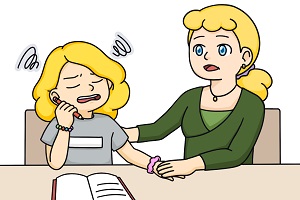
Children with ADHD can sometimes struggle with homework. This might be because they:
- have worked hard all day at school and need some downtime before they can focus on homework
- need help to understand what they need to do
- need encouragement to keep them interested in the homework task.
Here are some ideas to make homework less stressful, and possibly even enjoyable for your child.
Homework: children and teenagers | Raising Children Network
ADHD – ways to help children at school and home | Kids Health Info
Summary
- Children with ADHD may take longer to learn the skills they need to be independent.
- Adults play an important role in helping children to become independent.
- Simplifying instructions, breaking tasks down, establishing routines and celebrating effort and progress are great ways you can help.

Children with ADHD can find it harder to be independent with everyday tasks.
Some might find it hard to:
- remember instructions or each step in a task
- stay focused long enough to finish things
- organise their belongings
- keep track of time
- manage frustration when things don’t go to plan.
How you can help
With the right support, children with ADHD can build independence.
Make instructions clear and simple
- Give your child one instruction at a time, rather than a long list of things they need to do.
- Use pictures or a checklist to show them what they need to do.
- Ask them to repeat the instructions to check they’ve understood.
Create routines and structure
- Have a regular daily routine to help your child know what to expect.
- Use visual schedules or a timer to keep them on track.
- Use alarms, reminders, or apps to help with time management.
- Use a timetable, diary or calendar to help with organisation.
- Set up a dedicated space for schoolwork.
- Reduce distractions, such as turning off the TV and making sure they have a clear work area for homework.
Encourage problem solving and decision making
- Let your child make small choices. For example, 'Would you like to do your homework before or after a snack?'.
- Help them talk through problems instead of telling them what to do.
- Praise them for trying, not just when they succeed. This will build their confidence and resilience.
Support emotional regulation
- Teach your child calming strategies like deep breathing or taking a break to move their body.
- Encourage positive self-talk. For example, I can do this, or One step at a time.
- Acknowledge their feelings and help them find solutions.
Gradually increase responsibility
- Start with small, achievable tasks and build up.
- Offer help at first, then step back as they gain confidence.
- Celebrate progress, even if things aren’t perfect.
It is important to remember that even if your child has developed independence with some tasks, they may still sometimes need extra support when they are tired, hungry or feeling overwhelmed.
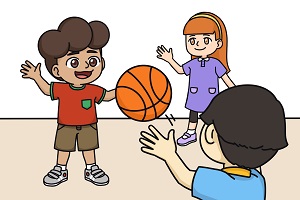
A warm and responsive relationship with your child is the foundation on which they will develop future relationships with others.
Your child’s communication and social skills will develop throughout primary and high school. Their needs, worries and friendships will also change over this time.
Explore the links below for ways you can connect and communicate with your child as they grow.
School-age connecting and communicating | Raising Children Network
Pre-teens communicating and relationships | Raising Children Network
Summary
- Children with ADHD find it harder to stay focused on activities that need lots of thinking or when they don’t find a task interesting.
- Children with ADHD may say they’re bored more than other children their age.
- You can help by finding ways to increase the fun and novelty in everyday activities like chores or homework.
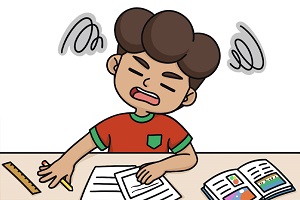
Children with ADHD often struggle to stay focused on difficult tasks or when they are bored.
You might notice your child:
- avoids or delays homework, chores, or other activities
- becomes frustrated, distracted, or restless when doing something difficult
- loses interest in activities quickly, especially those without immediate rewards
- complains that they are bored and struggles to come up with ideas or plans to move onto another activity without your help
- really focuses on activities they like, such as screen time, and finds it hard to move on to other tasks.
Why does this happen?
Tasks that take a lot of effort or activities that don’t have an immediate reward can feel overwhelming or uninteresting for children with ADHD.
This is not laziness or being naughty, it's about:
- Struggling with attention
- Having difficulty getting organised and planning what they need to do
- Managing distractions.
How you can help
Decrease the mental load.
- Reduce distractions when your child needs to focus. For example, make sure it is quiet, use headphones, and help your child keep their workspace tidy.
- Break tasks into smaller, manageable steps.
- Encourage movement breaks before and after tasks that are difficult for your child.
- Practise difficult tasks when there is time and not when you’re in a rush.
Make it more interesting.
- Make tasks that may be difficult more fun for your child. For example, turn chores into a race or dance party, use coloured pens for homework, or turn less interesting tasks into games by giving points and trying to get the highest score.
- Provide choices where possible. For example, 'Would you like to do your maths or reading first?'
- Pair tasks that are difficult with something enjoyable. For example, listening to music while tidying up.
- Use your child’s strengths and interests to make tasks more fun. For example, if your child enjoys football, try to include this in their maths homework. If your child is good at drawing, get them to draw the elements of their story as well as write about what happens.
- Give praise, small rewards, or help your child track their progress when doing a difficult task. Encourage your child’s effort rather than results.
Manage transitions.
- Warn your child before suddenly changing activities. For example, 'Five more minutes, then we start homework'. Use a timer so you don’t have to watch the time or keep warning your child that time is nearly up.
- Use a structured routine to help prepare your child before starting a difficult task. For example, a snack followed by a movement break and then homework.
- Help your child to get started on a difficult task and give them suggestions for things to do next.
Other resources to explore
ADHD: supporting children & pre-teens | Raising Children Network
Boredom, play & child development | Raising Children Network
Summary
- Raising a child with additional developmental needs can be particularly stressful.
- It is important to look after yourself – and you’ll be better able to help your child.
- Taking a break or seeking support are good ways to look after your own mental and physical health.

Supporting a child who has additional developmental needs can be difficult. You might feel:
- worried about your child
- overwhelmed by their behaviour
- unsure about the best way to help them develop and learn
- stressed about other things happening in your life.
It is important to take time to look after your own mental health and wellbeing. This might include:
- talking to a friend or family member about how you’ve been feeling
- taking time for yourself like going for a walk
- making sure you get enough sleep
- catching up with a friend
- speaking to your GP, a psychologist or counsellor.
When you look after yourself, you are better able to help your child. Looking after your own mental health also shows your child that this is an important part of life.
Explore the links below for more ideas.
Parent mental health & wellbeing | Raising Children Network
Parenting and mental health | Beyond Blue
The following services are free and can support you when things feel tough.
Summary
- Talking to other people about your child’s ADHD is important. This helps you get the right support both at school and at home.
- Having these conversations can be tricky, especially if other people don’t know much about ADHD.
- Finding out more about ADHD will help you have these conversations.
- Talking about ADHD will also help you find support.
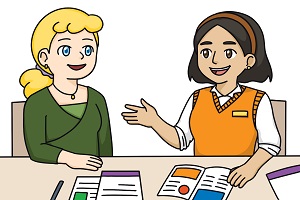
Parenting a child with ADHD comes with unique joys and challenges.
Talking to family, friends, teachers, and others about your child's ADHD can help create understanding, build support, and strengthen relationships.
Understanding ADHD and your child’s needs
- Learn about ADHD from trusted sources so you are able to share accurate information.
- It might help to describe ADHD as a difference in how the brain works rather than as a behavioural problem.
- Use simple, positive language. For example, 'ADHD means my child has lots of energy and needs to move to focus'.
- Highlight your child’s strengths alongside their challenges. For example, 'Jack’s ADHD means he thinks and learns differently. He’s really creative and has a great sense of humour, but sometimes he finds it hard to sit still and focus'.
Advocating for your child
- Advocating means to speak-up, support or take action to help your child.
- Before any meetings, write down key points you want to discuss and practice what you want to say so you feel prepared.
- Share what you have noticed works or doesn’t work and ask others to share what they have noticed. Working together with others means everyone can support your child to succeed.
- Stay calm and focus on solutions rather than things you find frustrating. For example, 'I’ve found that using a checklist helps Lily get through her weekend chores quicker and I don’t need to remind her so much. Could something like this help at school too?'
Helping others understand ADHD
- Many people don’t know much about ADHD, and ADHD is different in every child. Share what ADHD looks like for your child.
- Gently correct incorrect beliefs. For example, 'It’s not about being lazy. ADHD affects how the brain processes information'.
- Be patient, some people may take time to understand.
- Share reliable resources and websites with those who want to learn more.
Finding and building support
- It is useful to talk to people who understand and will support you and your child.
- Connect with other parents of children with ADHD for advice and encouragement.
- Advocate for your child at school by working with teachers and support staff.
- Look for professional advice when you need it. There’s no shame in asking for help.
- Remember to look after yourself. Helping your child is easier when you feel well supported.
You can find support by:
- joining a local or online ADHD parenting group
- asking your child’s school about resources or ways they can support your child
- talking to close family and friends about how they can help you and your child
- speaking with your GP or paediatrician about other people or services that can support you and your child.

